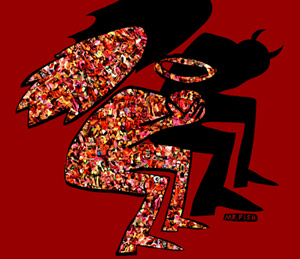Empathy for the Devil
I first saw the massive spread of twinkling lights that is Los Angeles at night from the San Gabriel Mountains in the early 1990s while visiting from Philadelphia. It was stunningly beautiful and made me think of a phone interview that I’d heard on CNN a year earlier just after New Year’s during the Gulf War.I was no more moral than anybody else. Only arrogance and conceit will ever tell you any different.
I first saw the massive spread of twinkling lights that is Los Angeles at night from the San Gabriel Mountains in the early 1990s while visiting from Philadelphia. It was stunningly beautiful and made me think of a phone interview that I’d heard on CNN a year earlier just after New Year’s during the Gulf War.
The images that were being telecast during the interview were those of nighttime warfare, the sort that made every television set in America appear as if it was a murky green fish tank full of randomly ejaculated sparks and vague flashes of percussive light almost too dim to see. Saddam Hussein by that time had already lost his air force and had begun to run out of Scud missiles, which, as projectiles, were never any more precise or destructive than far-flung empty hot water heaters, and there was little doubt, particularly in countries not being fed the CNN feed, that some brutally excessive and wholly unnecessary slaughter of Iraqi soldiers and civilians was being perpetrated in the desert.
The interviewee was a 10-year-old Israeli girl who was being asked her opinion about how well the U.S.-led coalition forces were faring in their bombing campaign — a loaded question to be sure, particularly because a 10-year-old girl might not be trusted to honestly answer the question “Did you brush your teeth?” without a corroborating fondling of her toothbrush’s bristles to test for wetness; forget about asking her to elaborate on something as outlandishly subjective as a war. Thus, it was not a question in search of a real answer. Instead, it was an attempt by a news corporation to give its viewers the same thrill at holiday time that radio listeners got to experience in the 1940s while listening to Edward R. Murrow tell them how the GIs were sacrificing their own innocence and pleasant dispositions and apple-cheeked virginity to the noble barbarity of butchering all the fascist monsters who wanted to devour America’s children, grandchildren, puppies and kittens.
The girl answered the question by saying, “I heard an American pilot who was dropping bombs on Baghdad at night say that it looked beautiful, like a Christmas tree. I don’t think I’ll ever understand Americans.”
Sitting in the dark woods above the L.A. basin a year after that interview, with the scent of pine and damp roots and cold earth permeating my clothes, I wondered what super-sparkly destructiveness I was looking at down below and I questioned the sanity of my elation. Sure, I knew that there was a difference between me looking down at Tinseltown from a wooded mountaintop in Southern California and a U.S. fighter pilot exploding the soft gooey insides of Iraqis from an F-15 Eagle, but the difference was by no means significant enough to make what was startlingly similar inconsequential; the similarity, of course, being that both my and the pilot’s physiologies were completely interchangeable in their reaction to what each had experienced.
Both said “neato” and asked that we not turn away, declaring that there was poetry in what we had witnessed.
Ever since then I’ve wondered how anybody can ever really feel morally superior to anybody else, even when comparing himself to those who might find beauty in the rocket’s red glare as it vaporizes those whose only retaliation against annihilation is to stain the soles of the conqueror’s shoes. With that in mind, I’ve also extended my mystification to the question of whether or not anybody can truly be classified as evil. Kurt Vonnegut has famously claimed that there are no villains in the human species, nor are there heroes. It was his belief that only those circumstances born from the intellectual and emotional inadequacies of humankind should be seen as being either good or bad — and, then, not even as good or bad, but rather as fortunate and unfortunate.
Can this be right?
In early September of last year I went to Yasgur’s farm, the site of the 1969 Woodstock Festival, to douche Glenn Beck out of my brain. Earlier, after several days of watching and rewatching the televised footage of the Fox News nimrod pacing back and forth in front of the Lincoln Memorial and spouting off, like an Archie Bunker who had been properly Eliza Doolittled, about how it was time for all the white, racist, heterosexual, gun- and tea-toting Jesus freaks in Middle America to reclaim their former glory as repressive and paranoid snobs unembarrassed by their infantile urge to flaunt their prejudices and petty hatreds in public, the coiled slime inside my skull had become fetid and stinky and in need of the hard vinegar stream of some bleeding-heart, communal optimism.
Remembering a conversation that I’d had with my brother several weeks earlier, I knew that three of the most notorious bleeding-heart communal optimists known to Jann Wenner were scheduled to perform at the Pavilion Stage at the Bethel Woods Center for the Arts, just several hundred feet from the pile of rocks marking where the original Woodstock stage stood some 41 years earlier; those bleeding-heart communal optimists being David Crosby, Graham Nash and Stephen Stills, the Peter, Paul and Mary of the Folk You! Generation. With only lawn seats available for purchase, I decided to send an e-mail to Graham Nash, whom I’d interviewed several months earlier and with whom I’d enjoyed some correspondence, to ask if he could get me a ticket that might put me closer to the stage. Seventy-two hours later, I was walking down a grassy hillside from overflow parking at the Bethel Woods Center for the Arts, with the inspiring tang of marijuana smoke in the air and the deeply satisfying vision of young and old hippies and bedraggled Vietnam vets and their wives and girlfriends and kids, everybody congregating around their cars and minivans and warming their conversations over small hibachis and beer coolers and Bic lighters. “QO?” muttered a barefoot teenager sitting cross-legged on a Mexican blanket who, with the long hair and beard, might’ve been Jesus Christ had his lips, ears, nipples and nose not contained enough piercings to make me think that he was much more like a fish that, by being festooned with so many hooks, had been mutilated by the questionable good luck of having escaped the frying pan.
“Huh?” I said, stopping to look down and notice that he was surrounded by rows and rows of what was either homemade jewelry or Slim Jims that had been fellated into thin reeds and used to lasso whatever he could find at the bottom of his grandmother’s junk drawer.
“Quarter ounce?” he asked, grinning and squinting into the sun that was setting behind my head. “Thirty bob?”
“What?” I said.
“Thirty bob, governor?” he said, no doubt attempting to turn his little drug deal into something quaint and literary and time-honored.
“Oh, no thanks,” I said, smiling and walking away. Shielding my eyes and looking in the direction of the Pavilion Stage, I figured that I had about half a mile to go before I reached the will-call window, so I busied myself by trying to remember exactly how much a quarter ounce of pot was and whether 30 bucks was even a fair asking price. I remembered back to my freshman year at college and the time when I went with my older brother to buy some cocaine in North Philly. I thought about how I felt as if we were ascending the innards of a cuckoo clock upon climbing the wooden stairwell in the drug dealer’s apartment house, which was dark and ramshackle and full of cobwebs. Then there was the drug dealer himself, living all alone in the top room, precisely where I imagined the clock’s cuckoo would reside, all bug-eyed and sweating, his insides seemingly full of baby spiders all looking for a way out, the job of going cuckoo every half-hour enough to prevent him from ever relaxing, much less sitting down and catching his breath. “Your brother tells me that you’re a writer,” he said, worrying the grubby hem of his T-shirt with his yellow fingers, his red hair and freckles making him look like an explosion in mid-blast. I half-shrugged and agreed. “I am, too!” he said. “I got something that I want you to read. It’s a reworking of “Freewill” by Rush. I rewrote it in Elizabethan English and it’s a little long, practically fills a whole notebook, but it’s awesome — let me get it!” He went to get it and I picked up the tiny pile of crushed twenty-dollar bills that I saw on his dresser and shoved them into my pocket, figuring that dealing coke might be against the law but combining Rush with Elizabethan English was an abomination against both God and nature and something that nobody should be allowed to give away for free.
I thought about the drug dealer’s scale and how my brother looked that afternoon hunched over it like a chemist. Then I thought about all the scales that all drug dealers everywhere use. I considered the ounce as a unit of mass and I wondered if when a drug dealer says that something “weighs an ounce” he’s referring to the drugs that are being weighed or the mechanism that registers the weight. Sure, I figured, an ounce requires the corroboration of a scale to qualify its legitimacy, but if all scales have slightly different calibrations — and they do! — then where does the truth reside, in the ounce or in the device used to qualify the ounce as an ounce?
That said, is an ounce an ounce because it is deemed to be an ounce by a scale or is it an ounce because an ounce is a hard-core truism that we use our minutely varying scales to roughly approximate? Can the truth even be approximated or is the truth true only when it is absolute? If the truth can be approximated, then it cannot be a fact, but rather it must be an opinion, and if the truth is a matter of opinion then morality can have no legitimacy as a foundation upon which humankind can determine right from wrong. Thus, human values are as arbitrary as favorite colors and because no one has a favorite color called whitepinkredorangebrownyellowgraygreencyanblueviolet, the twin classifications of hero and villain must at one time or another fall to each of us with at least tangential justification, whether we’re driving like an asshole down the highway or trying to balance a budget or trying to keep a crown on our head or dropping bombs on so-called enemies on a battlefield or forgiving the devastation of the environment because we can be thrilled by a trillion twinkling electric lights that stretch to the horizon.
After 20 more minutes of walking at Bethel Woods I settled into my seat, barely 15 feet from the stage, feeling less like somebody who was there to have Glenn Beck and his Nur für Deutsche-type Honor Rally flushed from his short-term memory and more like somebody who had exploited the very same hierarchical social structure that Beck and his chums typically celebrated as enlightened living, the In-GOP-We-Trust coins remaining unspent and copulating in their trousers, their noses thrust into the air with the tips edging that much closer to the air-conditioned ass of God™ himself. I had tapped into a system that rewarded privilege and relegated everybody else to the slow line, and because I had access to the celebrity of Graham Nash — celebrity being just another word for royalty — I was able to enter the event free of charge and glide past all the cheap seats and half-pirouette into my chair like Elton John at a royal wedding. It didn’t matter that my favorite color was light blue foil and that I never comb my hair and seldom wear underpants and that I can’t keep my fingers out of my nose and make no secret of my disdain for practically everything that the dominant culture stands for: I was no more moral than anybody else. Only arrogance and conceit will ever tell you any different.
And then, when the old lady in front of me, during Stephen Stills’ guitar solo for “Love the One You’re With,” lost her teeth because she was doing the Hammer so hard and people needed to use the light from their cell phones, mine included, to find them, I didn’t care that I was just another face in the crowd because I knew that at least in a crowd, every once in a while, everybody will lift his or her feet together and peer into the darkness to find a single person’s filthy smile.
Your support matters…Independent journalism is under threat and overshadowed by heavily funded mainstream media.
You can help level the playing field. Become a member.
Your tax-deductible contribution keeps us digging beneath the headlines to give you thought-provoking, investigative reporting and analysis that unearths what's really happening- without compromise.
Give today to support our courageous, independent journalists.






You need to be a supporter to comment.
There are currently no responses to this article.
Be the first to respond.